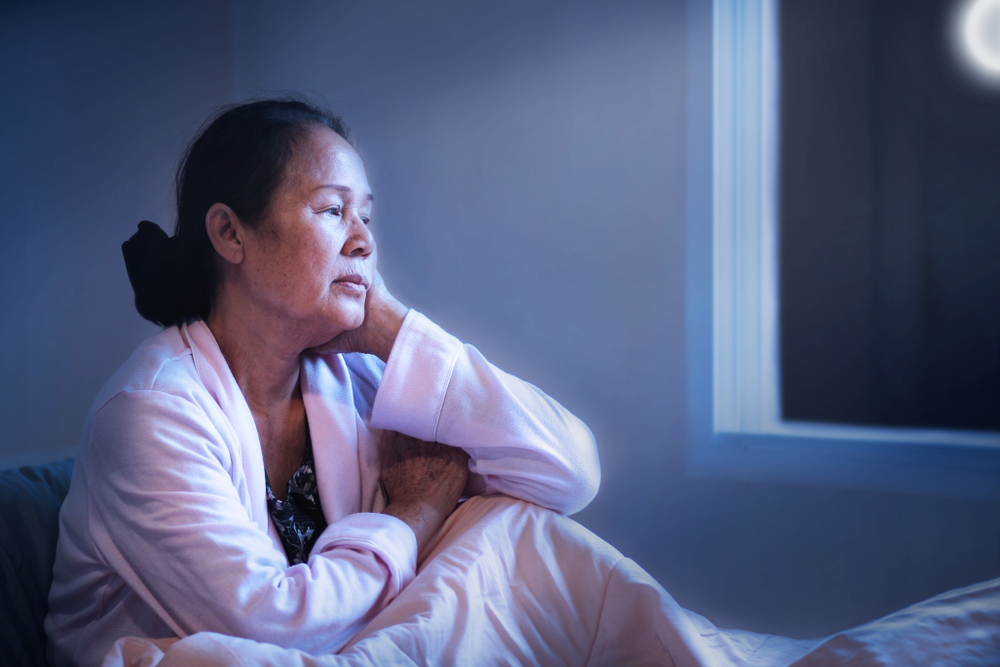How to Keep the Elderly in Bed at Night
Category:

Many older adults have trouble staying asleep at night due to numerous factors. This can include everything from lifestyle factors to medications. Alzheimer’s and dementia can also often contribute to restlessness and anxiety. But what can we do to help older adults sleep better? In this post, we’ll review how to keep dementia patients in bed at night as well as reasons why older adults get their sleep disrupted.
Download Our FREE Guide to Around-the-Clock Care
Why Do Older Adults Get Their Sleep Disrupted?
Before we review how to keep a dementia patient in bed, it’s vital to understand why older adults often get their sleep disrupted. Reasons why older adults have trouble sleeping include:
- Dementia and Alzheimer’s disease. As we stated earlier, these conditions can often contribute to restlessness and anxiety.
- Health issues. Conditions such as diabetes and prostate problems can cause older adults to frequently urinate, which can disrupt sleep. Furthermore, health issues such as kidney disease or heart failure can make lying flat uncomfortable, making it more challenging to get a restful night’s sleep.
- Insomnia. According to the Journal of Clinical Sleep Medicine, up to 48% of older adults experience symptoms of insomnia. This sleep disorder is characterized by difficulty falling asleep, staying asleep, or getting quality sleep.
- Lifestyle factors. Caffeine consumption or limited physical activity during the day can make it difficult to fall asleep.
- Loss of melatonin. As bodies age, they produce less melatonin, which is a natural hormone that regulates sleep cycles. This can negatively impact sleep patterns.
- Medications. Certain medications, such as those that manage high blood pressure or depression, can disrupt sleep.
Finally, let’s take a look at how to keep an elderly person in bed.
How to Keep the Elderly in Bed at Night
Not being able to get a restful night’s sleep can be frustrating but there are several steps one can take to ensure older adults get proper rest. These include.
- Establishing a regular sleep routine. This can include reading before bed, taking a bath or shower, or simply winding down. Older adults should also avoid alcohol or caffeine before bed and create a dark and quiet environment to encourage a restful night’s sleep.
- Decreasing screen time. Replace electronics or television with activities that are calming and relaxing, such as reading books or taking a walk outside.
- Monitoring diet. Avoid foods that are difficult to chew or might be difficult to stomach. It is also vital to get enough protein, vitamins, carbohydrates, and fiber.
- Keeping bathroom needs in check. Provide bathroom assist products, such as bed pans, urinals, underpads, and overnight adult diapers. Also, be sure to limit fluid intake before bedtime and avoid bladder irritants, such as coffee and alcohol, at least eight hours before bedtime.
Setting up a bedtime organizer. Older adults may seek out medications, drinks, or snacks in the middle of the night. Set up a stand or organizer stocked with food, bottled water, and/or medications so they can easily reach for them and have no need to leave bed. This can also include sources of entertainment, such as books or a reading light.
To learn about our home care services, contact our caregiving team today at 1-800-GRISWOLD or find a Caregiver near you.
Subscribe
Date: 2024-12-19
Category:


